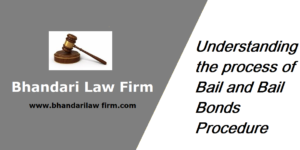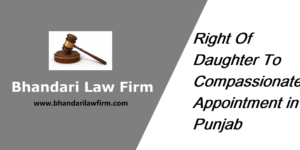Maintenance Of Wife, Children And Parents; Under The Criminal Procedure Code, 1973
The Sections from 125-128, chapter IX, in the CRPC, 1973 deals with maintenance of wives, children and parents.There are various provisions given related to maintenance such as who is entitled to maintenance, essential conditions for granting maintenance, the procedure of maintenance, alteration of the previous order and enforcement of order of maintenance, among others. Maintenance Of Wife, Children And Parents; Under The Criminal Procedure Code, 1973
Section 125 is a measure of social justice and is specially enacted to protect women and children to adhere to the constitutional mandate and sweep under Article 15(3) which is further reinforced by Article 39 of The Indian constitution.
In lieu of Section 125, a magistrate of first class upon the proof of neglect or refusal to maintain; in spite of having sufficient means:
- His wife: who has been divorced; or obtained divorce and has not remarried
- Legitimate or illegitimate children; irrespective of married or not; and even if married and the minor daughter’s husband does not have sufficient means, until she attains majority.
A ‘Minor’ is a person who, under Section 3 of the Indian Majority Act, 1875 is deemed not to have attained his majority i.e., above the age of 18 years.
In Shahbuddin v State of UPI (2006) DMC 626, a minor daughter attaining majority during the pendency of the application for maintenance was held entitled to maintenance up to the date of majority.
A Muslim minor girl is entitled to get maintenance from her father even after the enforcement of Muslim Women (Protection of Rights on Divorce) Act, 1986.
- Legitimate or illegitimate major child; except married daughter- where the child is physically challenged or has a mental abnormality and or injury.
- His; father or mother; all of whom are unable to maintain themselves;
-shall make a monthly allowance, at a rate which he thinks fit to pay the same for their maintenance; After the 2001 amendment, he may also if he thinks fit, order such person to make a monthly interim maintenance and also pay for the expenses of proceedings as he from time to time directs. Such should be disposed of within 60 days from date of service of notice of application.
However, a wife cannot claim maintenance and any such order made can be cancelled in case
- She is living in adultery or she without any sufficient reason refuses to live with her husband as held in the case of Rachita Rout vs. Basant Rout, 2002 Cr. L.J 3418
- If without sufficient reason she is living without her husband
- If she is living separately by mutual consent
What shall be the amount or quantum of such maintenance?
The quantum of maintenance depends on the standard of living. In simple words the amount should be just and equitable to the status and earnings of the family; such that both the parties can live at par in an equivalent lifestyle.
The object of the maintenance proceedings is not to punish for neglect, but to prevent homelessness and poverty-stricken life by making those responsible who can provide support to those who are unable to support themselves and who have a moral claim to support.
In the landmark case of Mohd. Ahmed Khan vs. Shah Bano Begum, 1985 (2) SCC 556, it was held by the Supreme Court that Section 125 is a secular procedure and was meant to protect the interest of all including Muslim women. However, due to opposition, the Central Government brought in a legislation for remedies of the Muslim women, this act allows them to avail the remedy under Section 125 only if the husband consents to the same.
In the case of Chanmuniya vs. Virendra Kumar Singh Kushwala&Anr, SLP (Civil) No.15071 of 2009, a larger bench of the Supreme Court sat to decide upon whether a man and a woman who are living together for a long time even without a valid marriage, raises a presumption of the same entitling the woman to maintenance. They answered in affirmative; ‘wife’ includes cohabitation for a reasonably long period of time even if no strict proof of marriage exists so as to fulfill, he true beneficial essence of the Section 125.
In Savitaben Somabhai Bhatiya v. State of Gujarat, Appeal (crl.) 399 of 2005, it was held that Section 125 of the Code has been enacted in the interest of a wife and one who wants to take the benefit under sub-section (l)(a) of Section 125 has to establish that she is the wife of the person concerned. The issue can be decided only by a reference to the law applicable to the parties. It is only when such a relationship with reference to personal law is established that the application for maintenance can be maintained. The issue whether Section 125 is attracted or not, cannot be answered except by a reference to the appropriate law governing the parties.
In the case of Abdul vs. Ashya AIR 1960 Ker 101, it was held, that for children the basis of application and entitlement to the maintenance is the paternity test.
(Read Also How To File Domestic Violence Complaint)
Where to file an application of maintenance?
An application for maintenance may be filed against any person, liable to pay the same, in any district-
- Where he lives
- Where he or his wife resides
- Where he previously before lived with the person claiming for maintenance.
As per Section 126, the procedure adhered to is similar to that of the summons case as the nature of this case is not strictly criminal; an application instead of a complaint is sent to the magistrate.The evidence to be taken in the presence of a person against whom maintenance is to be ordered, however an ex parte decree by the magistrate can be given if it is proved that the man is willfully absconding.
As per Section 127, in case of alteration of allowance as such the husband and wife starts residing back together after the maintenance has been finalized and taken into course, it shall continue. The magistrate who has made an order under Section 125 can enforce this order where that person lives who have to give maintenance.He has to satisfy two conditions before enforcement of such order:
- Identity of parties, and
- Proof of non-payment of allowances.
Enhancement and Reduction of maintenance
Section 127 of said Act provides the provision of alteration in the amount of maintenance. Procedure is as under:-
(1) On proof of a change of circumstances of a person, receiving, under section 125 a monthly allowance, or ordered under an equivalent amount to pay a monthly allowance to his wife, child, father of mother, as the case may be, the Magistrate may make such alteration of allowance as he thinks fit for the allowance for the maintenance or the interim maintenance, as the case may be;
Provided that if he increases the allowance, the monthly rate of 500 rupees within the whole shall not be exceeded.
(2) Where it appears to the Magistrate that, in consequence of any decision of a competent criminal Court, any order made under section 125 should be cancelled or varied, he shall cancel the order or, may alter the amount of maintenance accordingly.
(3) Where any order has been made under section 125 in favour of a lady who has been divorced by, or has obtained a divorce from, her husband, the Magistrate shall, if he is satisfied that-
(a) the lady has, after the date of such divorce, remarried, cancel such order as from the date of her remarriage;
(b) the lady has been divorced by her husband which she has received, whether before or after the date of the said order, the entire of the sum which, under any customary or personal law applicable to the parties, was payable on such divorce, cancel such order-
(i) in case where such sum was paid before such order, from the date on which such order was made,
(ii) in case, from the date of expiry of the amount , if any, that maintenance has been actually paid by the husband to the lady. Maintenance Of Wife
(c) a women has obtained a divorce from her husband which she had voluntarily surrendered her rights to maintenance after her divorce, cancel the order from the date thereof. Maintenance Of Wife
(4) At the time of creating any decree for the recovery of any maintenance or dowry by a person, to whom a monthly allowance has been ordered to be paid under section 125, the civil Court shall take under consideration the sum which has been paid to, or recovered by, such person as monthly allowance for the upkeep and interim maintenance or any of them, because the case could also be, in pursuance of the said order. Maintenance Of Wife
What happens if there is failure to pay the maintenance ordered to be paid?
In such a case a warrant has to be issued under Section 125 (3) of the Code for payment of maintenance, when an application is made by the person who has been held entitled to maintenance under Section 125 of the Code.
Thereafter, it has to be levied as the amount due in the manner provided for levying fines and if this warrant is not responded by making the payment, then the magistrate can order the imprisonment.
Note: This article was written by Ms. Richaa Mukhopadhyay, 4th Year Student of B.A. L.L.B, Amity Law School, Amity University, Kolkata. For more information or Query you may contact us.



